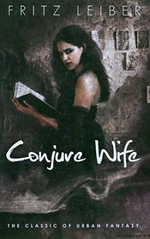
![]() charlesdee
charlesdee
7/21/2012
![]()
Before I knew any better, I assumed that Fritz Leiber's Conjure Wife was the basis for Rene Clair's film I Married a Witch. But no. Clair's 1942 film is based on Thorne Smith's The Passionate Witch, published posthumously in 1941. Leiber's novel came out in 1943 and therefore is neither the source of Clair's classic film or, by extension, the long-running 1960's sitcom Bewitched. I could apply the "classic:" modifier to the TV program as well, but it would only prove how pliable a term "classic" can be. Both Clair's film and the sitcom are comedies, although of a very different order, and from what I have read about Smith's novel it has darker undertones than its subsequent adaptations. Leiber's novel is not lacking in dark comedy, but it plays out as a classic horror story.
Brilliant, dedicated academic Norman Saylor – and you have to love that name. Norman/Normal, get it? – Norman Saylor is a direct descendent of the antiquarians and academics M.R. James subjected to supernatural horrors at the turn of the 20th century. He is the young, hotshot professor of sociology and anthropology at stuffy Hempnell College, the sort of institution somewhere in the northeastern United States where students attend daily chapel and most of the professors' wives practice witchcraft. Saylor comes to learn this last fact when he uncovers that his own wife, Tansy – another name you have to love, along with the fact that Saylor had an affair with her while he was an instructor and she a student at another institution – when he discovers that Tansy has filled the house with charms and potions to protect him in the overwhelmingly hostile environment of Hempnell. Saylor, good husband and practical scientist that he is, orders Tansy to dispose of all her magic geegaws, which she does. All hell breaks loose.
Saylor cannot help but be condescending when he considers his wife's practices. "If he had ever wondered about Tansy and superstition at all, it had only been to decide, with a touch of self-congratulation, that for a woman she was oddly free from irrationality." As evidence mounts that witchcraft, often of a most malevolent kind, is rampant among faculty wives, Saylor, lubricated with alcohol, thinks, "Why shouldn't the women be the witches? They're the intuitionalists, the traditionalists, the irrationalists. They're superstitious to start with." A few drinks later, he is on another tack:
The strange thing was that these thoughts were not altogether unpleasant. They has a wild, black, poisonous beauty of their own, a lovely deadly shimmer. They possessed the fascination of the impossible, the incredible. They hinted at unimaginable vistas. Even while they terrorized, they did not lose that chillingly poignant beauty. They were like the visions conjured up by some forbidden drug. They had the lure of an unknown sin and an ultimate blasphemy. Norman could understand the force that compelled the practitioners of black magic to take any risk.
(The paragraph above offers proof that Leiber was both a fan and a correspondent of H.P. Lovecraft.)
Conjure Wife is a novel of male anxiety provoked by confrontation with female power, but it does not have the unpleasant panic response of similar tales that become popular a few decades later. I'm thinking of Stephen King's Misery, Clint Eastwood's early directorial effort Play Misty for Me, or Adrian Lynne's paean to female homicidal mania, Fatal Attraction. These are stories of healthy, red-blooded American males under assault by irrational, homicidal females. My God, in Fate Attraction, Glen Close is so sex-maddened that she destroys Michael Douglas's Mercedes. These are women who must not only be stopped, they must be obliterated, and they are. Thank God, things can get back to normal.
Saylor learns to respect his wife's power and even to master enough of it to save her life. He must step completely out of the world he knows and expose himself to dangerous forces where the outcome is anything but certain. And things will never return to normal. "Normal," to the extent that is retains any meaning at all, will always be open to question.
http://www.potatoweather.blogspot.com